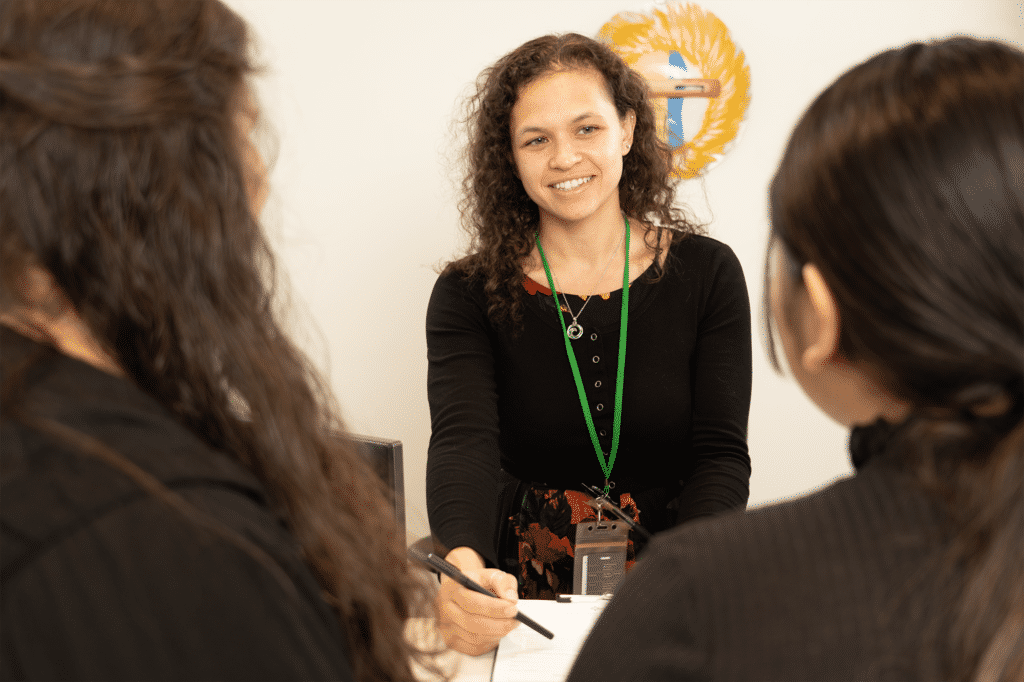21 Nov Voices for Justice: A Stepping Stone to Success
By partnering with youth detention centers, ANJC aims to reduce recidivism among young offenders

When Ian Millard left the McLaughlin Youth Center (MYC) at 19, he didn’t think he needed help finding a job or a place to live. But he had entered the juvenile detention center at the age of 12; he was starting from zero, and he was on his own.
Back to Where They Started
He had reason to worry. According to data collected by Alaska’s Department of Juvenile Justice, 37 percent of youth released from MYC in 2020 reoffended and reentered a juvenile facility. In the same year, 23 percent of Alaska’s youth offenders statewide returned to detention, or recidivated.[1]
“When a young person leaves a treatment or detention facility, they may be returning to unstable home settings, struggle to remain in school, or lack the skills needed to be successful,” pointed out Austin Johnson, a Restorative Justice program manager at the Alaska Native Justice Center (ANJC).
Young people who are about to leave MYC work with the institution’s caseworkers, who help them plan their transition back into the community. But that support is only available for 90 days. After that, youth like Ian are on their own.
That’s where ANJC comes in.
Tools That Support Stability
ANJC staff partner with MYC and other juvenile detention centers to help young people ages 14 – 22 transition out of facilities. At MYC, ANJC maintains an office onsite, allowing youth advocates to provide Learning Circle groups, Life Skills classes, and case management.
“The whole purpose of us being there is to grow that connection with the youth, so that once they leave, we can immediately provide reentry services,” Austin explained.
That connection allows advocates to help young people navigate aspects of “adulting” that might otherwise be difficult for a 19-year-old, like Ian, to figure out. Advocates can provide assistance with housing, education, employment, legal services, cultural connectedness, health care, and other related services—the kinds of necessities that help young offenders find the stability and other protective factors that contribute to reducing recidivism.

Steps into Adulthood
Initially, Ian didn’t feel like he needed assistance. At MYC, he had developed many of the skills he would need to become a successful adult, and he had participated in ANJC activities, including learning effective communications tools.
“But when I was released, the housing market was terrible. I couldn’t get an apartment,” Ian shared.
ANJC helped place him at a halfway house until he could find permanent housing. When he eventually secured an apartment—with ANJC assistance—he realized there were things he hadn’t thought of.
“I had nothing for cooking, no bed, no furniture. I didn’t think about the vast majority of things—like buying a cutting board. Who thinks of that?” Ian said.
An ANJC youth advocate took him shopping for necessities. Ian also received assistance with obtaining his driver’s license and paying for school, where he is learning welding and mechanics, while he also works a full-time job.
Those simple steps—finding stable housing, landing a job, purchasing things like a bed and kitchen supplies—can make a tangible difference in whether a young person stays out of detention or recidivates.
While the average length of ANJC’s case management support for youth leaving treatment or detention is six months, said Austin, “They can continue with our Youth Reentry programs for as long as they need, as long as they’re actively working toward the goals they’ve set with their case managers.”
Statewide Services
This year, ANJC expanded their Youth Reentry services to Johnson Youth Center (JYC) in Juneau. ANJC’s Anchorage-based case management staff provides ongoing virtual services, including bi-weekly Life Skills groups, with young offenders in Juneau. Once every three months, they visit JYC in person and engage the residents in live Life Skills groups, Learning Circles, cultural activities, and community events.
Based on their success with JYC, ANJC Youth Reentry aims to offer similar services to additional Division of Juvenile Justice facilities.
The work ANJC does to equip young people to become successful adults would be impossible without your support. Be a voice for justice: Consider a donation to the Voices for Justice fundraiser.
Learn more about ANJC’s Youth Reentry and other youth-focused programs at anjc.org.

[1] Department of Juvenile Justice statistic.


